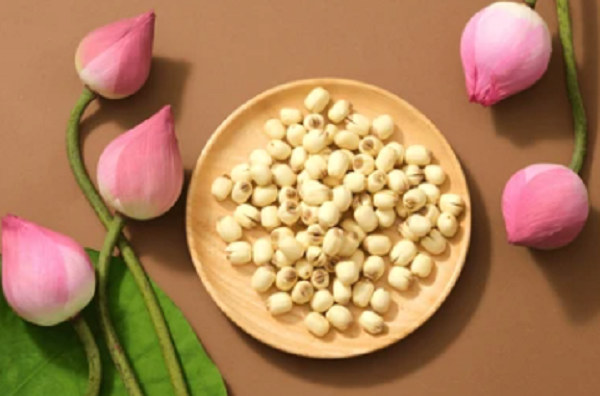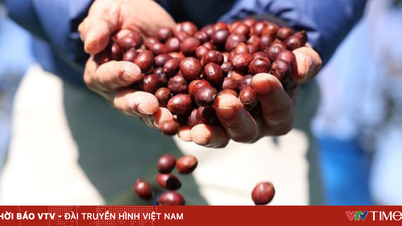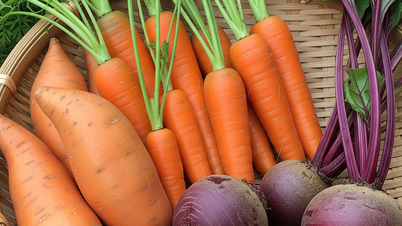Specialist Doctor 2 Huynh Tan Vu, Head of Daytime Treatment Unit, University of Medicine and Pharmacy Hospital, Ho Chi Minh City, Facility 3 said that the seed Lotus is very rich in nutrients. According to the national nutrient database of the United States Department of Agriculture (USDA), 100g of dried lotus seeds contain 332 kcal, 64.47g of carbohydrate, 15.41g of protein, 1.97g of fat, no cholesterol, 104µg of folate, 163mg of calcium, etc. Lotus seeds also contain beneficial plant compounds with antioxidant properties such as flavonoids, glycosides, phenolics and alkaloids.
Lotus seeds are considered a great source of nutrients and bring many health benefits.
Below are the benefits of lotus seeds as shared by Dr. Huynh Tan Vu.
Helps sleep well , relax, reduce stress.
Lotus seeds have sedative and antispasmodic properties that help relax the nerves and help you sleep better. Lotus seeds are rich in flavonoids, alkaloids, saponins, tannins and terpenoids, which have anxiolytic properties. The isoquinoline alkaloids in lotus seeds dilate blood vessels, reducing anxiety and depression.
Numerous studies have shown that alkaloids present in lotus seeds exhibit various neuropharmacological activities, such as sedative, anticonvulsant, antidepressant, and neuroprotective effects.
"Therefore, eating lotus seeds has the potential to exert therapeutic effects against central nervous system disorders such as anxiety, depression and insomnia. They are often used in herbal teas or eaten as a snack to create a sense of peace," Dr. Vu shared.

Lotus seeds contain many nutritional values.
Good for the heart
Lotus seeds' energy comes mainly from carbohydrates and protein, unlike other seeds whose high energy value comes mainly from fat. The low fat and cholesterol content, combined with the high potassium content, makes lotus seeds a heart-healthy food.
"The low sodium and high magnesium content in lotus seeds keeps the heart healthy, prevents diabetes, prevents obesity and balances blood pressure. Isoquinoline alkaloids - the component that creates the bitter taste of lotus heart, have been proven to have sedative and antispasmodic effects, helping to dilate blood vessels and reduce blood pressure," Dr. Vu shared.
Hypoglycemic effect
Lotus seeds have a low glycemic index, which limits sudden spikes in blood sugar levels, and can help control blood sugar levels.
Studies have demonstrated that the hypoglycemic effects of the minerals potassium, sodium, calcium, magnesium and manganese in lotus seeds may play direct and indirect roles in insulin secretion and maintaining normal glucose levels in the body.
In addition, lotus seeds contain little sodium and a lot of potassium, so it reduces blood pressure and is also good for diabetics. Fiber and carbohydrates in lotus seeds also contribute to neutralizing cholesterol in the blood, helping to stabilize and prevent many complications and cardiovascular diseases.
Support digestion
Lotus seeds are rich in fiber, which helps prevent constipation, promotes regular bowel movements, reduces symptoms of diarrhea, and contributes to overall intestinal health. Lotus seeds contain small amounts of alkaloids that contribute to the antispasmodic activity of the intestines, thereby reducing diarrhea.
Good for pregnant women
Fresh and dried lotus seeds are an excellent source of calcium and folate for pregnant women and their unborn babies. 100 g of dried lotus seeds provide 104 μg or 26% of folate. Folate, along with vitamin B12, is one of the essential components of DNA synthesis and cell division. Adequate folate intake during pregnancy can help prevent neural tube defects in newborns.
In addition, lotus seeds also help to stabilize the pregnancy and enhance the immunity of pregnant women. Vitamin B6 or pyridoxine in lotus seeds has been studied to effectively reduce nausea in pregnant women.
Improve sexual health
Lotus seeds contain bioactive plant compounds that are excellent aphrodisiacs that significantly increase sexual desire in both men and women. They promote blood flow to the reproductive organs, providing these tissues with essential nutrients and energy, while enhancing sexual health and fertility. Adding a few roasted lotus seeds to one’s regular diet can effectively help treat erectile dysfunction in men and low libido in women.

Adding lotus seeds to your diet is a great way to aid in weight loss and fat loss.
Lose weight, lose fat
Lotus seeds are low in calories, rich in protein and fiber. Adding lotus seeds to your diet is a great way to support weight loss, fat loss, and fight obesity. Protein helps reduce appetite, and fiber moves slowly through the digestive tract, making the body feel full for a long time during the day. Research shows that lotus seeds can inhibit the formation of fat cells, reduce the weight of fat tissue, and improve blood lipids. In addition, polyphenols in lotus seeds can improve the lipid composition of the body, significantly reduce intracellular lipid accumulation, and slow down weight gain.
Antioxidant, immune booster
Fresh lotus seeds contain 31.24 mg/kg of vitamin C, which is an antioxidant. Together with other plant compounds with antioxidant activity, eating lotus seeds helps strengthen the immune system to fight infectious agents and eliminate harmful oxygen free radicals from the body, which will reduce the risk of certain diseases such as cardiovascular disease, cancer, etc.
Anti-inflammatory, pain reliever
Studies show that lotus seeds contain kaempferol, a natural flavonoid, which has the function of preventing inflammation and helping to repair aging tissues, preventing dermatitis, and limiting skin diseases. Antioxidants can also reduce inflammation, which can be beneficial for inflammatory conditions such as rheumatoid arthritis, gout, psoriasis, and inflammatory bowel disease. The anti-inflammatory effects found in lotus seeds soothe pain in the oral cavity, helping to relieve pain caused by mouth ulcers and mouth ulcers. Flavonoids in lotus seeds can help relieve pain.
Like other dicotyledonous seeds, lotus seeds are also gluten-free. So they can be used as a healthy, safe alternative for patients with wheat gluten allergies and celiac disease.
In addition, astriment in lotus seeds is useful in improving taste, helping to support appetite due to illness or other causes.
Source link


![[Photo] General Secretary To Lam receives US Ambassador to Vietnam Marc Knapper](https://vphoto.vietnam.vn/thumb/1200x675/vietnam/resource/IMAGE/2025/9/29/c8fd0761aa184da7814aee57d87c49b3)

![[Photo] Many streets in Hanoi were flooded due to the effects of storm Bualoi](https://vphoto.vietnam.vn/thumb/1200x675/vietnam/resource/IMAGE/2025/9/29/18b658aa0fa2495c927ade4bbe0096df)

![[Photo] General Secretary To Lam attends the ceremony to celebrate the 80th anniversary of the post and telecommunications sector and the 66th anniversary of the science and technology sector.](https://vphoto.vietnam.vn/thumb/1200x675/vietnam/resource/IMAGE/2025/9/29/8e86b39b8fe44121a2b14a031f4cef46)
![[Photo] National Assembly Chairman Tran Thanh Man chairs the 8th Conference of full-time National Assembly deputies](https://vphoto.vietnam.vn/thumb/1200x675/vietnam/resource/IMAGE/2025/9/29/2c21459bc38d44ffaacd679ab9a0477c)






























































































Comment (0)